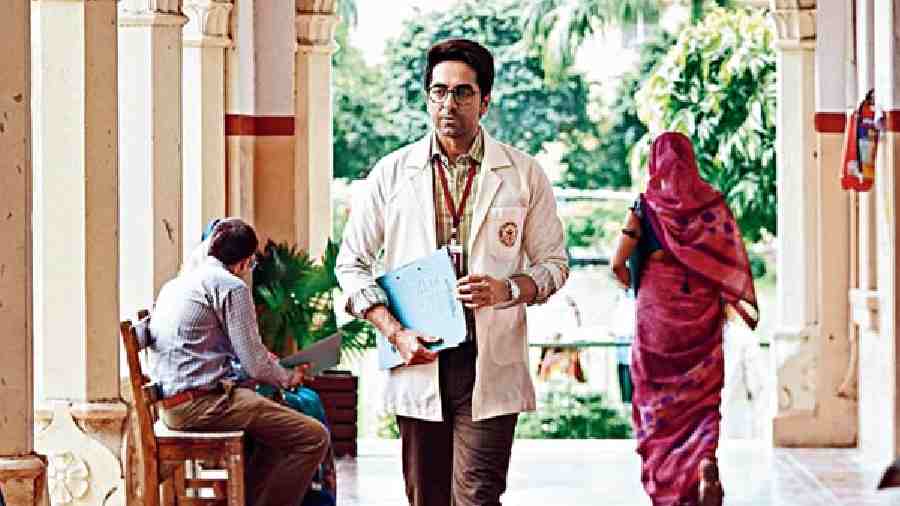Doctor G is a revision of the Ayushmann Khurrana textbook that we now kind of know by heart. Let’s tick off the boxes: a mousy, small-town protagonist battling pride of his own and prejudice of society; his discomfort in a certain situation brought about by his own complexities and his gradual self-awakening; quirky, small-town characters armed with a few one-liners and jokes which may or may not land, depending on how familiar they sound to you; an all’s-well-that-end’s-well ending coinciding with the protagonist’s coming-of-age story.
That protagonist is, of course, Ayushmann, in various small-town versions. Doctor G is set in Bhopal and if Vicky Donor, his debut film, had Ayushmann walking confidently into a clinic and donating sperm (thus attempting to remove the taboo around sperm donation), he does a full circle here and plays a medical student who, through the gradual self-awakening of his character, tries to destigmatise gynaecology, specifically the taboo around a male doctor opting for the discipline.
Which is what I found pretty strange about Doctor G. There are perhaps as many male doctors of gynaecology as there are female, give or take a few, even in the small towns. But Anubhuti Kashyap, in her feature directorial debut, wants us to believe that this is the domain of only women. Hence, for a large part of the film, gynaecology is referred to as ‘stree rog’.
The trajectory of Ayushmann’s Uday, at least in the first half, is familiar. Lower grades force Uday to give up on his dream of pursuing orthopaedics, at least for the time being. The only discipline which will keep him in Bhopal, and close to his mother (Sheeba Chaddha can now play these roles in her sleep), is a lone seat in gynaecology. That sets up the narrative for some laughs, most of which are brought on by Uday being bullied by an all-girls’ class, including his senior Fatima (Rakul Preet Singh) and his initial hesitation in examining female patients. However, the humour is laboured and not as free-flowing as it should be. Familiar situations are mined time and again with the hope they will deliver a chuckle or two, but most of them don’t work.
In Half Two, Doctor G changes gears to become a completely different film. The narrative changes track to focus on other characters, and though there is an attempt to bring it together in the end, it isn’t all that seamless.
At its core, Doctor G has an interesting idea. That most men don’t really understand — or make an attempt to understand — what women really want. But the writing is too muddled (Kashyap being aided by Sumit Saxena, Saurabh Bharat and Vishal Wagh is a case of too many cooks spoiling the broth) for that idea to come through with any kind of a fresh treatment. The constant emphasis on the fact that Uday needs to lose his ‘male touch’ to become better at his job is misplaced, with Doctor G busying itself in earning its feminist cred when it doesn’t really need to.
Too many stereotypes abound in a film which wants to be different. The quirky male friend, for one, is a trope done to death. The only freshness comes in through the equation that Uday and Fatima share, which is not romantic. But the film’s biggest failure is in saddling Shefali Shah with a role that is unforgivably one-note.
Ayushmann has, in the last 10 years, travelled the whole gamut of body and bodily functions and attempted to un-taboo them. But what was once niche is now slowly and surely becoming mainstream and losing the edge that it once had.
More about the film
Doctor G (A)
Director: Anubhuti Kashyap
Cast: Ayushmann Khurrana, Shefali Shah, Rakul Preet Singh, Sheeba Chaddha, Indraneil Sengupta
Running time: 124 minutes











